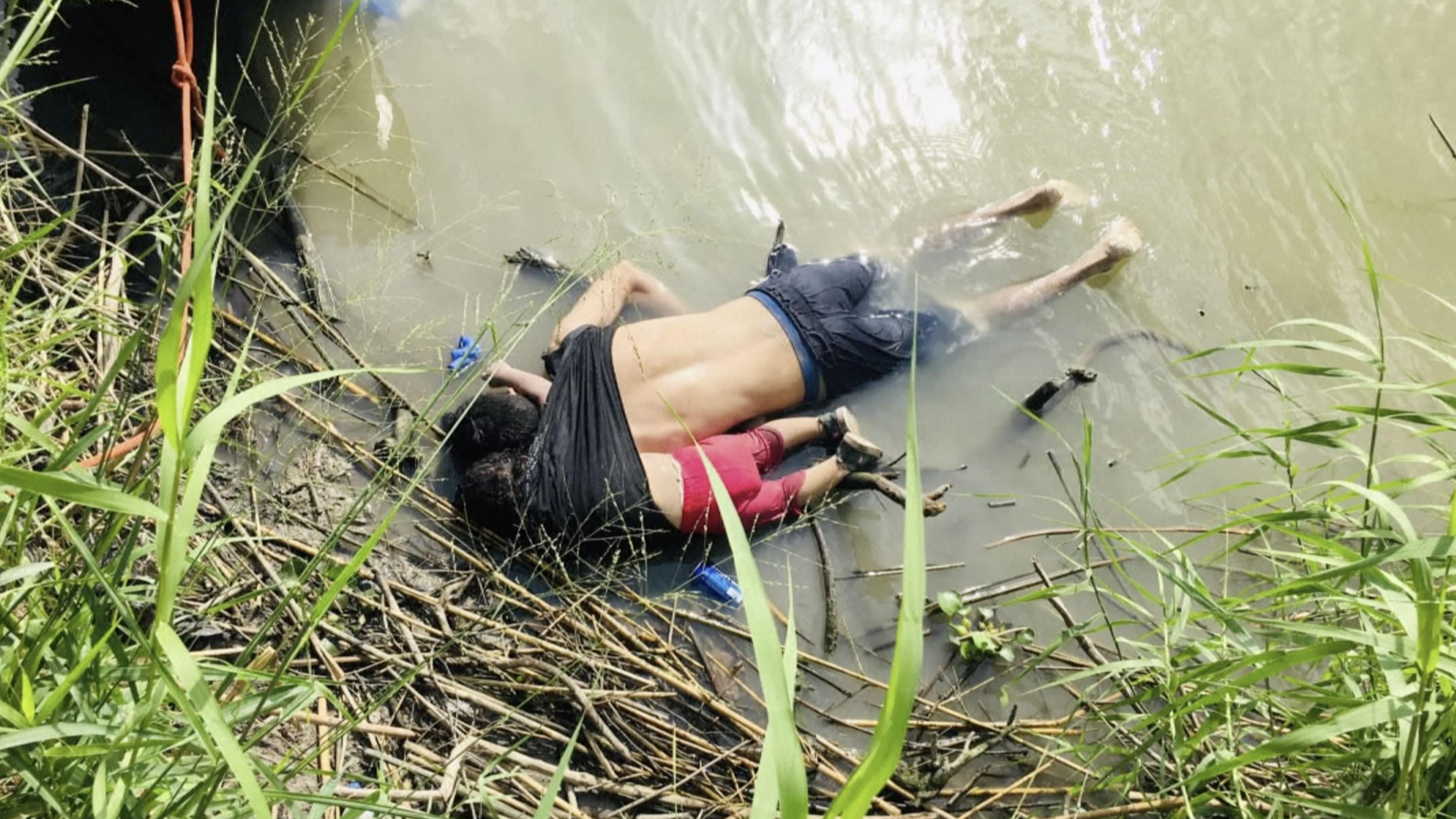WASHINGTON, June 26 (CGTN) -- A harrowing photo of a Salvadoran migrant and his young daughter who drowned in the Rio Grande at the U.S.-Mexico border became the focus on Wednesday of a U.S. political debate over President Donald Trump's asylum policies.
The picture of Oscar Alberto Martinez, 25, and his 24-month-old daughter Angie Valeria put a renewed focus on the plight of refugees and migrants who are mostly from Central America. The pair had traveled from El Salvador and were seeking asylum in the United States.
They drowned Sunday while trying to cross the Rio Grande from Mexico into Texas, while the child's mother watched helplessly from the river bank.
Enrique Maciel, director of the migrant agency of the Mexican state of Tamaulipas, said the Martinez family had decided to cross the river after being told they needed to register for a waiting list to apply for asylum at the Matamoros-Brownsville port of entry.
Oscar's grief-stricken mother, Rosa Ramirez, told reporters her son dreamed of a better life for his baby daughter and she had urged her son not to leave, fearing danger would meet him on the long journey north.
For many, the image evoked memories of a 2015 picture of a Syrian toddler drowned on a Turkish beach after a failed attempt to reach Greece.
Debate over Trump's asylum policies
U.S. presidential candidate Bernie Sanders called the image "horrific" and said the president's migration clampdown made deaths more likely.
"Trump's policy of making it harder and harder to seek asylum, and separating families who do, is cruel, inhumane and leads to tragedies like this," he wrote on Twitter.
Democratic Senator Chuck Schumer of New York displayed the picture on the Senate floor during a speech on Wednesday.
"How could President Trump look at this picture and not understand that these are human beings fleeing violence and persecution?" Schumer asked.
In turn, Trump blamed the Democrats, whom he said were blocking his government's attempts at closing "loopholes" in U.S. law that encourage migrants to apply for U.S. asylum.
"If they fixed the laws you wouldn't have that. People are coming up, they're running through the Rio Grande," he said, referring to the river known as the Rio Bravo in Mexico that forms a large part of the border between the two countries.
"They can change it very easily so people don't come up, and people won't get killed,” Trump told reporters.
The Republican-controlled Senate passed a bill on Wednesday providing 4.6 billion U.S. dollars to deliver aid to the southern border before the government runs out of money to care for thousands of migrant families and unaccompanied children, but the bill must now be reconciled with a version passed by the Democratic-held House.
The House bill , which contained tougher requirements for how detained children must be treated, faced a White House veto threat and was easily rejected by the Senate.
Once the differences are worked out the bill will go to Trump for his signature.
Migrants keep flowing in
The photo comes amid a public outcry in the United States over the poor detention conditions of migrant children following a visit to a Border Patrol center in Clint, Texas, by a group of lawyers and doctors.
Nearly 250 children were transferred out of Clint on Monday but a Customs and Border Protection official said that some 100 were being sent back there.
Record numbers of Central American migrants are reaching the United States this year despite a crackdown by Trump. Many flee their homes in Central America to escape poverty, drought and high levels of criminal violence, much of it carried out by street gangs.
U.S. border patrol agents have apprehended 664,000 people along the southern border so far this year, a 144 percent increase from last year, said Brian Hastings, chief of law enforcement operations for the U.S. Border Patrol. "The system is overwhelmed," he said.
Deaths are not uncommon, with travelers exposed to violence from criminals as well as the treacherous waters of the Rio Grande and desert heat. On Tuesday, U.S. Border Patrol agents near Eagle Pass, Texas recovered a man's body from another stretch of the river. Several more have drowned this year.
Border Patrol reported 283 migrant fatalities on the border in 2018. Activists say the number is higher as the remains of many migrants who die in rugged stretches of wilderness along the 3,138-km long border are never found.
To manage asylum flows, the United States has in recent years implemented a system known as "metering" which puts daily limits on the number of asylum seekers processed at ports of entry, leading to weeks-long waiting lists in dangerous border towns.
The controls have contributed to growing numbers of migrants crossing the border illegally to hand themselves in to authorities and ask for asylum. Migrant rights activists say such limits on people's access to asylum can put them in harm's way, while driving migration underground and squeezing it into new routes.


